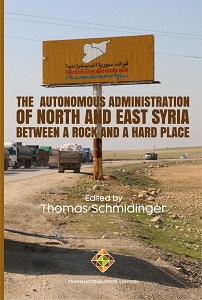On the Kurdish Quest for Autonomy: Rojava’s Political System and the Structures of Self-Administration in North and East Syria
On the Kurdish Quest for Autonomy: Rojava’s Political System and the Structures of Self-Administration in North and East Syria
Author(s): Rosa Burç
Subject(s): Governance, Ethnic Minorities Studies, Politics and Identity
Published by: Transnational Press London
Keywords: Kurdish; Quest; Autonomy; Rojava’s Political System; Structures of Self-Administration; North and East Syria;
Summary/Abstract: With the withdrawal of the Syrian government’s military forces in 2012from Syria’s northern areas with a Kurdish-majority population, local political forces not only achieved control but also became vanguards in building an autonomous entity, widely known as Rojava, based on the principles of decentralisation, pluralism, and grassroots organisation. Although the autonomous Kurdistan Region of Iraq (KRI) came into being as the first formalised and institutionalised form of Kurdish territorial autonomy, theRojava model manifests a developing, yet new, approach to the question of self-determination for the Kurds and other minorities in the Middle East. It shifts the focus from the non-existence of Kurdistan as a nation state towards the role of bottom-up politics as a counter-hegemonic sphere built through women’s autonomy, radical self-governance, as well as the reinvention of nationhood beyond ethnic dogmatism.
Book: The Autonomous Administration of North and East Syria: Between A Rock and A Hard Place
- Page Range: 81-96
- Page Count: 16
- Publication Year: 2020
- Language: English
- Content File-PDF

